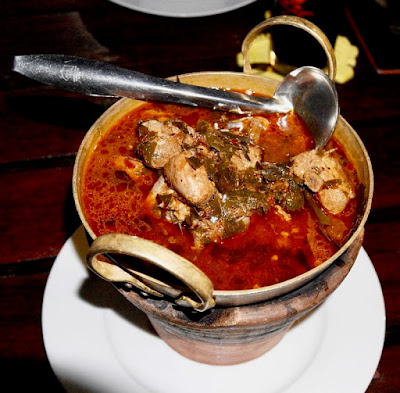This was a random jaunt to the kitschy Tamnanpar Resort which surprisingly has decent Thai food at its restaurant, considering it caters to foreign tourists. Well, its water park and slides and all got panned on forums, along with the resort's rooms, but it has apparently been around for 20 years. Wahhhh.
Mainly here to taste a Chanthaburi-style spicy-sour pork stew unique to the province. (แกงคั่วหมูใบชะมวง; phonetically it's kinda like, 'gaeng moo kap bai cha-muang'.) Learnt of a new-to-me vegetable called 'cha-muang' (ชะมวง, leaves of the garcinia) that the locals in and around Rayong use almost exclusively in pork stew. We were a bit skeptical because the meat in this stew is generally supposed to be fatty, and we weren't inclined to eat all fatty bits. But we were surprised when the pot arrived because this kitchen gave more lean meat in the form of ribs! Yay! Apparently, Tamnanpar Resort does this particular spicy-sour-sweet pork stew beautifully.
 |
| Said pot of pork stew. แกงคั่วหมูใบชะมวง. |
At dessert, a chat with the friends reminded me how fun language could be. They asked what 'wo-paeng' sounded like to me as a non-native Thai speaker, and if it meant anything. I was like, not really. It sounded vaguely like a Teochew word. But hey, I'm not good with dialects. Then when the dessert arrived, I did some furious Googling. The friends ordered a Thai dessert of 'wo-paeng' (วอแป๋ง). IT LOOKED SO FAMILIAR. Its pronunciation is taken from either Cantonese or Teochew pronunciation, and/or plain Chinese script. It's what we know in Singapore and Hong Kong as 'red bean pancake' or '红豆窝饼'. You'd have seen this dessert at many Chinese restaurants. In Thailand, it's also filled with jujube (Chinese red dates) or taro. For Thai language, while its script is derived from Sanskrit, many common words are taken from Teochew, Cantonese and Mandarin.
The other day, someone had asked me what's the advantage of knowing so many languages. I think the fun in understanding regional languages is because of a pre-understanding of historical and cultural links. It makes it easier. I'm completely lost when I learn, say, Norwegian (be it Nynnorsk or Bokmål), my only other help (from friends) and point of reference is Swedish. I suppose it's always about getting the basics right, thoroughly understanding each language's grammar and syntax.
I'm extremely competitive; I never learn a language at a superficial level. If I want to start on it, I go the whole hog. I don't just want to be average in it. At the very least, it's gotta be conversant. There must be a certain level of proficiency that goes beyond commenting on the weather and asking for directions, reading the menu and ordering food. With a strong command of the languages, I can find similarities across the board, which will also link to diaspora and culture.
I'm extremely competitive; I never learn a language at a superficial level. If I want to start on it, I go the whole hog. I don't just want to be average in it. At the very least, it's gotta be conversant. There must be a certain level of proficiency that goes beyond commenting on the weather and asking for directions, reading the menu and ordering food. With a strong command of the languages, I can find similarities across the board, which will also link to diaspora and culture.
 |
| Said dessert of wo-paeng (วอแป๋ง) with taro done Teochew orh-nee style. It wasn't great because the filling was VERY SWEET, and the dough wasn't light and crisp enough. |
No comments:
Post a Comment